Filter by

Writing The Digital History Of Nazi Germany
This book will consider how the outcomes of “doing history digitally” include different kind of sources and data, as well as new ways of researching historical questions, and innovative forms of presenting history. All contributions focus on aspects related to the history of National Socialism, World War II and the Holocaust.
- Edition
- -
- ISBN/ISSN
- 9783110714692
- Collation
- -
- Series Title
- -
- Call Number
- Berlin/Boston
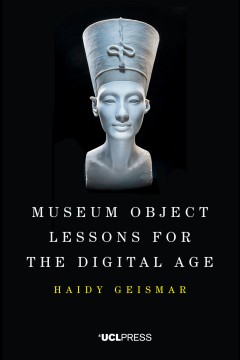
Museum object lessons for the digital age
Museum Object Lessons for the Digital Age explores the nature of digital objects in museums, asking us to question our assumptions about the material, social and political foundations of digital practices. Through four wide-ranging chapters, each focused on a single object – a box, pen, effigy and cloak – this short, accessible book explores the legacies of earlier museum practices of colle…
- Edition
- -
- ISBN/ISSN
- 9781787352810
- Collation
- xv, 139 p. ill;
- Series Title
- -
- Call Number
- 069.5 MUS H
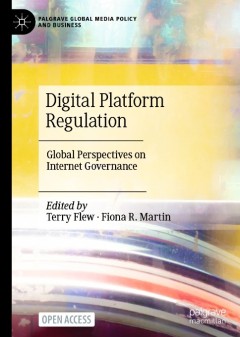
Digital Platform Regulation : Global Perspectives on Internet Governance
This Open Access volume provides an in-depth exploration of global policy and governance issues related to digital platform regulation. With an international ensemble of contributors, the volume has at its heard the question: what would actually be involved in digital platform regulation?’. Once a specialised and niche field within internet and digital media studies, internet governance has i…
- Edition
- -
- ISBN/ISSN
- 9783030952204
- Collation
- xvii, 319 p.
- Series Title
- -
- Call Number
- 384.334 DIG T
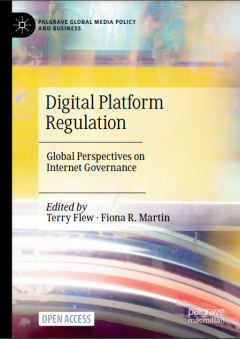
Digital platform regulation : global perspectives on internet governance
“When it comes to the governance of digital platforms, the question of who is regulating whom is now serious enough that scholars have begun to refer to governments as platforms, too. This volume provides a valuable sampling of how this problem looks from the side of government […]” — Sandra Braman, author of Change of State: Information, Policy, and Power; Texas A&M University …
- Edition
- 3
- ISBN/ISSN
- 978-3-030-95220-4
- Collation
- xvii; 319p;
- Series Title
- -
- Call Number
- 384.334 DIG T
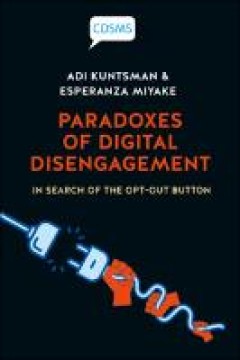
Paradoxes Of Digital Disengagement
Life is increasingly governed and mediated through digital and smart technologies, platforms, big data and algorithms. However, the reasons, practices and impact of how the digital is used by different institutions are often deeply linked to social oppression and injustice. Similarly, the ability to resist these digital impositions is based on inequality and privilege. Challenging the ways in w…
- Edition
- -
- ISBN/ISSN
- 9781914386336
- Collation
- -
- Series Title
- -
- Call Number
- Educational: Social sciences
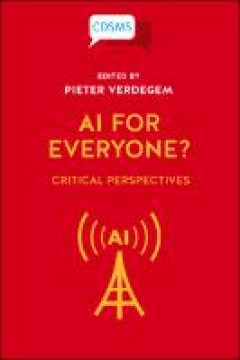
AI FOR EVERYONE? CRITICAL PERSPECTIVES
We are entering a new era of technological determinism and solutionism in which governments and business actors are seeking data-driven change, assuming that Artificial Intelligence is now inevitable and ubiquitous. But we have not even started asking the right questions, let alone developed an understanding of the consequences. Urgently needed is debate that asks and answers fundamental questi…
- Edition
- -
- ISBN/ISSN
- 9781914386169
- Collation
- 310p.
- Series Title
- -
- Call Number
- 006.3 FOR v

The psychosocial reality of digital travel : being in virtual places
When physical travel to a specific place is prohibited or otherwise difficult or impossible, digital travel provides a promising alternative. The technology to do this is now widely available and many people have the possibility to meet with others digitally, and thus alleviate the social effects of physical isolation. Digital travel can also be source of pleasure and entertainment, and man…
- Edition
- -
- ISBN/ISSN
- 9783030912727
- Collation
- xi, 152 p. ill;
- Series Title
- -
- Call Number
- 302.231 PSY I
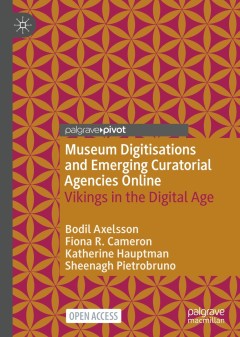
Museum digitisations and emerging curatorial agencies online : vikings in the…
This open access book explores the multiple forms of curatorial agencies that develop when museum collection digitisations, narratives and new research findings circulate online. Focusing on Viking Age objects, it tracks the effects of antagonistic debates on discussion forums and the consequences of search engines, personalisation, and machine learning on American-based online platforms. Furth…
- Edition
- -
- ISBN/ISSN
- 9783030806460
- Collation
- xv, 138p ; ill
- Series Title
- -
- Call Number
- 069.53 MUS m
Social Innovation in Higher Education : Landscape, Practices, and Opportunities
This open access book offers unique and novel views on the social innovation landscape, tools, practices, pedagogies, and research in the context of higher education. International, multi-disciplinary academics and industry leaders present new developments, research evidence, and practice expertise on social innovation in higher education institutions (HEIs), across academic and professional di…
- Edition
- -
- ISBN/ISSN
- 9783030840440
- Collation
- 313 p.
- Series Title
- Innovation, Technology, and Knowledge Management
- Call Number
- 650 PăU

Shaping the digital dissertation : knowledge production in the arts and human…
"Digital dissertations have been a part of academic research for years now, yet there are still many questions surrounding their processes. Are interactive dissertations significantly different from their paper-based counterparts? What are the effects of digital projects on doctoral education? How does one choose and defend a digital dissertation? This book explores the wider implications of di…
- Edition
- -
- ISBN/ISSN
- 9781800641006
- Collation
- vi, 290 p.
- Series Title
- -
- Call Number
- 370 KUH s
 Computer Science, Information & General Works
Computer Science, Information & General Works  Philosophy & Psychology
Philosophy & Psychology  Religion
Religion  Social Sciences
Social Sciences  Language
Language  Pure Science
Pure Science  Applied Sciences
Applied Sciences  Art & Recreation
Art & Recreation  Literature
Literature  History & Geography
History & Geography